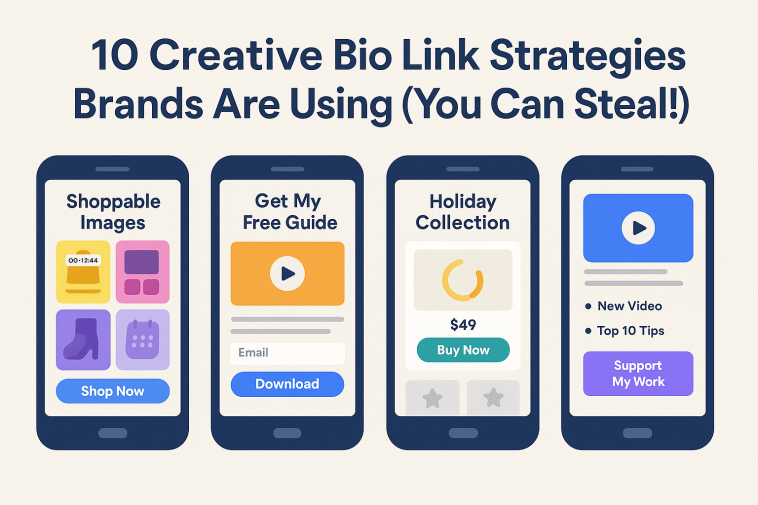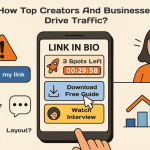Why your bio link needs a creative upgrade? The humble “link in bio” has evolved from a simple URL shortener to a powerful micro-website for brands, creators, and entrepreneurs. Today’s most effective bio link strategies treat it as a dynamic growth tool, not just a static link.
But most people still use it like it’s 2018 – just dumping links and hoping for clicks.
The smartest brands, however, are turning their bio links into conversion machines, lead magnets, and even mini-storefronts.
In this guide, you’ll discover 10 creative ways top brands use bio links – plus exact strategies you can copy today.
(Bonus: Tools like Cloudy make it easy to implement these ideas without coding.)
The “Swipe-Up Replacement” for Instagram (Even Without 10K Followers)
Bio link strategies have evolved far beyond basic link lists – and nowhere is this clearer than with Instagram’s ever-changing features. The most effective bio link strategies today turn limitations into opportunities for smarter engagement.
Problem:
Instagram killed the “Swipe-Up” feature for most users, replacing it with “Link Stickers” – but they’re still limited.
Solution:
Brands now use smart bio links as a permanent “Swipe-Up” replacement, driving traffic from:
- Instagram Stories
- Reels captions
- Post comments
Example: Fashion Brand’s “New Arrivals” Hub
Instead of linking to their homepage, they created a dedicated “New Drops” bio link with:
- Shoppable images (each linking to a product)
- A countdown timer (urgency)
- A newsletter signup (to capture leads)
Result: 23% more clicks than their old “linktr.ee” page.
How to Steal This Idea:
- Use a visual grid layout (like Cloudy’s “Gallery” widget).
- Link each image to a different URL (product, blog post, etc.).
- Add a call-to-action button (“Shop Now” or “Limited Stock”).
(Pro Tip: Update your bio link weekly to match your latest content.)
The “Lead Gen Machine” for Coaches & Consultants
Modern bio link strategies transform passive links into active lead generators – a game-changer for coaches who want to convert followers into clients. The best bio link strategies for service providers combine value delivery with seamless conversion paths.
Problem:
Coaches waste bio links by just linking to Calendly or a generic website.
Solution:
Turn your bio link into a lead magnet funnel with:
- A freebie download (checklist, PDF guide).
- A short video pitch (introducing yourself).
- A booking button (Calendly/Acuity).
Example: Life Coach’s “Free Mindset Guide”
Their bio link includes:
- A headline: “Get My Free 5-Step Confidence Guide”
- A short Loom video (“Here’s what’s inside…”)
- Email opt-in form (directly in the bio link).
Result: 45% opt-in rate from bio traffic.
How to Steal This Idea:
- Use Cloudy’s embed feature to add a lead form.
- Offer a low-commitment freebie (PDF, quiz, etc.).
- Place the CTA above the fold (no scrolling needed).
(Pro Tip: Test adding a face cam video – increases trust.)
The “E-Commerce Pop-Up Shop” for Small Businesses
Bio link strategies are revolutionizing how small businesses sell online – no expensive website required. These product-focused bio link strategies let you create a shoppable storefront that works 24/7 from your Instagram profile.
Problem:
Small businesses can’t afford a full website – but a Linktree looks unprofessional.
Solution:
A bio link that acts like a mini-store, featuring:
- Best-selling products (with images & prices).
- A “DM to Order” button (for Instagram shops).
- Testimonials (social proof).
Example: Jewelry Brand’s “Holiday Collection”
Their bio link includes:
- A carousel of top 3 products (with “Buy Now” links).
- A WhatsApp button (“Message to Customize”).
- A UGC section (“As seen on customers”).
Result: 12% of bio visitors converted to buyers.
How to Steal This Idea:
- Use a “Shop” template.
- Link to WhatsApp/Telegram for easy DMs.
- Add trust badges (“Free shipping”, “500+ sold”).
(Pro Tip: Rotate products based on seasonality.)
The “Content Hub” for Bloggers & Creators
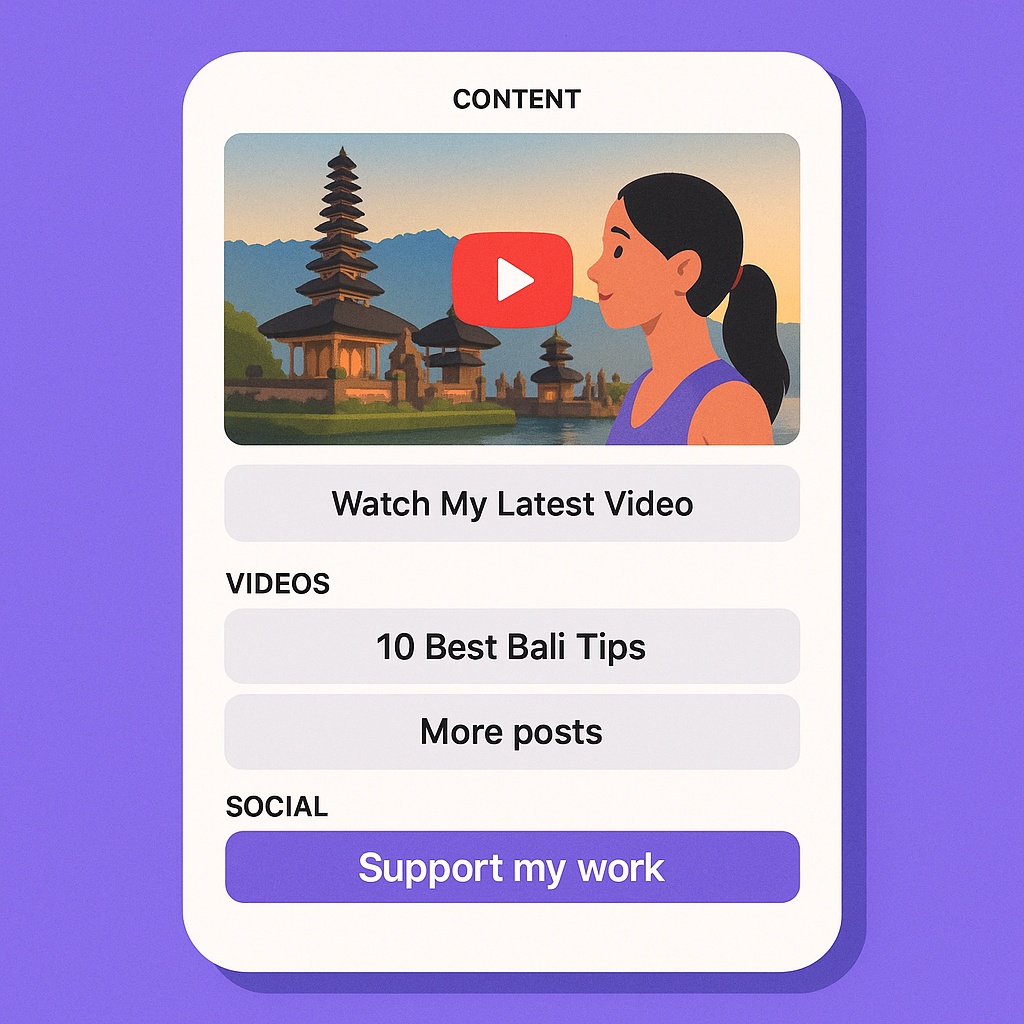
Your audience shouldn’t have to hunt for your best work – yet most creators scatter their content across endless platforms. Here’s how the smart ones solve it:
Problem:
Creators struggle to promote all their content (YouTube, blog, podcast, etc.).
Solution:
A centralized content hub with:
- Latest videos (embedded).
- Podcast player (listen in-bio).
- Archive links (“More posts”).
Example: Travel Blogger’s “Watch My Latest Video”
Their bio link features:
- An embedded YouTube video (auto-plays on mute).
- Links to top blog posts (“10 Best Bali Tips”).
- A Patreon CTA (“Support my work”).
Result: 2x longer session time than a basic Linktree.
How to Steal This Idea:
- Embed your latest video (helps with watch time).
- Organize links by category (Videos | Blog | Social).
- Add a search bar (will be available with Cloudy soon).
(Pro Tip: Update the video every time you post new content.)
The “Event Portal” for Virtual Summits & Webinars
First impressions matter – yet most events bury registration behind clunky forms. The solution? A bio link that becomes your event’s front door.
Problem:
Event promoters lose registrations by using messy Google Forms.
Solution:
A bio link as an event landing page with:
- Countdown timer (urgency).
- Speaker lineup (with photos).
- One-click registration.
Example: Marketing Summit’s “Last Chance to Join”
Their bio link includes:
- A timer (“Starts in 2 days!”).
- Testimonial videos (“Last year was amazing!”).
- A Stripe payment button (for paid events).
Result: 37% higher sign-ups than a standalone page.
How to Steal This Idea:
- Use countdown widget that provide some of the link in bio tools.
- Add speaker headshots (boosts credibility).
- Link to Eventbrite/Stripe for payments.
(Pro Tip: Change the bio link post-event to “Watch Replay”.)
The “FAQ Hub” for Customer Support
Customer service shouldn’t be a time sink – yet most brands waste hours answering the same questions daily. Here’s how to automate solutions while keeping it personal.
Problem:
Customers DM brands with the same questions (e.g., “Where’s my order?” or “What’s your return policy?”), clogging up DMs.
Solution:
A bio link as a 24/7 FAQ portal with:
- Order tracking link (via Shopify/AfterShip).
- Return policy PDF.
- “Contact Us” button (redirects to email/form).
Example: Eco-Friendly Apparel Brand’s “Help Center”
Their bio link includes:
- “Track Your Order” button (linked to AfterShip).
- “Size Guide” visual chart (PDF download).
- “DM for Urgent Help” (links to Instagram).
Result: 40% fewer repetitive customer service DMs.
How to Steal This Idea:
- Use PDF embed feature for guides.
- Add a floating WhatsApp button for quick queries.
- Label links clearly (e.g., “Shipping Info” vs. “Returns”).
(Pro Tip: Update the FAQ during peak sales seasons.)
The “Behind-the-Scenes” Pass for Superfans
Fandom thrives on exclusivity – yet most creators miss the sweet spot between free content and paid memberships. This is how top artists build hype without paywalls.
Problem:
Fans want exclusive content – but Patreon or paid memberships feel too commitment-heavy.
Solution:
A “VIP Access” bio link with:
- Private podcast episodes.
- Unlisted YouTube videos.
- Secret Pinterest mood boards.
Example: Indie Musician’s “Studio Sessions”
Their bio link features:
- Password-protected SoundCloud demos (password in newsletter).
- “Watch Our Tour Prep Vlog” (unlisted YouTube link).
- “Join the Fan Club” CTA (links to Discord).
Result: 3x newsletter signups from bio traffic.
How to Steal This Idea:
- Use Bit.ly passwords for private links.
- Embed hidden content (e.g., Google Drive folders).
- Gate access with email opt-ins (“Subscribe for the password”).
(Pro Tip: Tease exclusives in Stories – ”Link in bio for secret drop!”)
The “Local Business Menu” for Restaurants & Cafés
Your menu deserves more than a static PDF – especially when 83% of customers decide what to order before visiting (Source: Toast POS). Transform your bio link into a profit-driving digital menu that works while you sleep.
Problem:
Food spots change menus often – printed menus are outdated, and Google My Business lacks visuals.
Solution:
A bio link as a digital menu with:
- High-res food photos.
- Daily specials (updated in real time).
- “Order Now” buttons (Uber Eats, DoorDash).
Example: Café’s “Summer Drinks Menu”
Their bio link includes:
- Instagram carousel of new drinks (each links to details).
- “Order for Pickup” button (links to Toast/Clover).
- “Leave a Google Review” CTA.
Result: 15% increase in pickup orders.
How to Steal This Idea:
- Use Cloudy’s image widget for visual menus.
- Link to delivery apps (with referral codes).
- Add business hours (avoids “Are you open?” DMs).
(Pro Tip: Highlight seasonal items with emojis 🍂🎃.)
The “Affiliate Revenue Generator” for Influencers
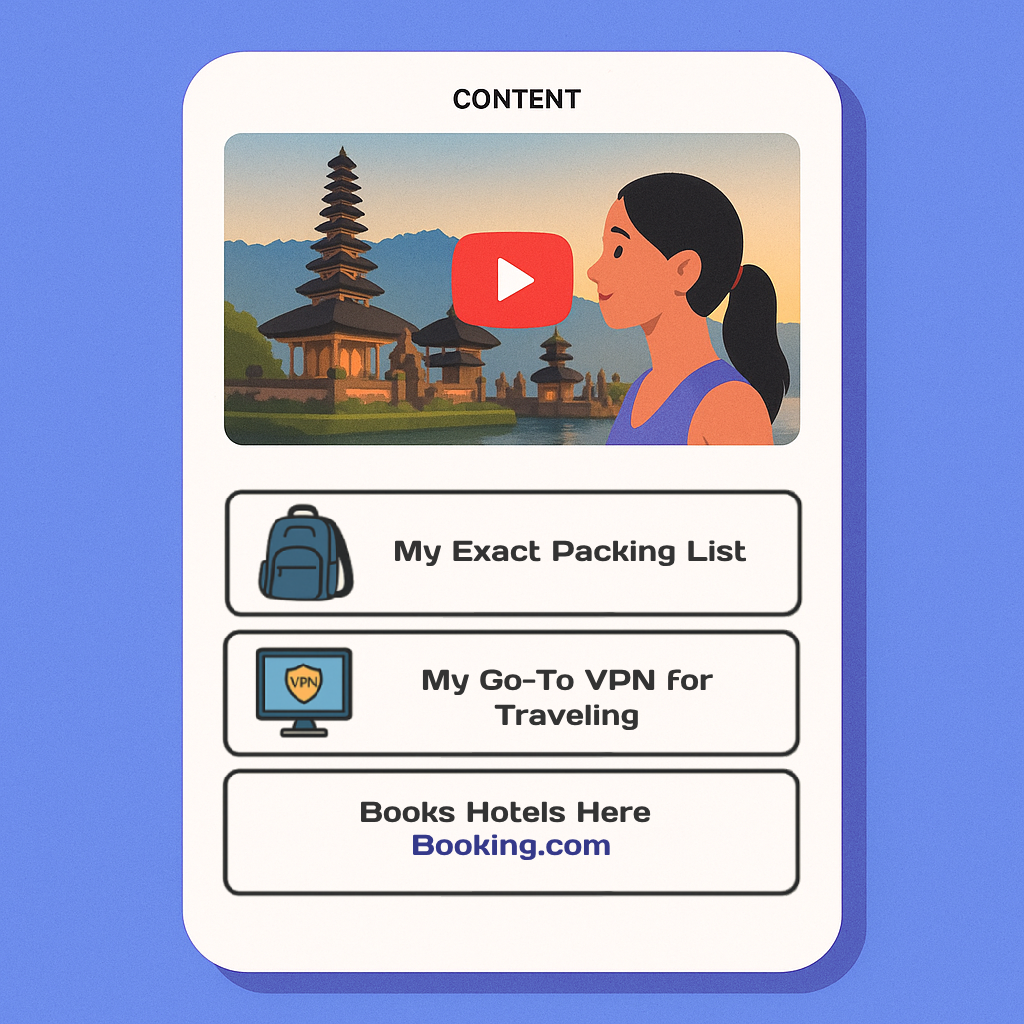
Stop leaving money on the table – disorganized affiliate links cost influencers up to 40% in potential earnings (Source: Influencer Marketing Hub). Here’s how top creators turn their bio into a 24/7 commission engine.
Problem:
Influencers share affiliate links haphazardly – followers ignore them or get overwhelmed.
Solution:
A curated “Favorites” bio link with:
- Themed collections (“Work From Home Essentials”).
- Embedded product widgets (Amazon/LTK).
- Discount codes (“Use promocode Cloudy”).
Example: Travel Influencer’s “My Camera Gear”
Their bio link features:
- “My Exact Packing List” (Amazon affiliate links).
- “VPN I Use” (with referral discount).
- “Book Hotels Here” (Booking.com affiliate).
Result: 28% higher affiliate click-through rate.
How to Steal This Idea:
- Organize links by niche topics (e.g., “Skincare” vs. “Tech”).
- Use link-tracking tools (Bit.ly, Tapfiliate).
- Add disclaimers (“Affiliate links support my work”).
(Pro Tip: Rotate links monthly to match trending products.)
The “Crowdfunding Campaign” for Creatives
Your art deserves funding – but scattered links cost you backers. Here’s how to turn your bio into a one-stop support hub that converts passive scrollers into invested patrons.
Problem:
Artists and filmmakers struggle to centralize support (Kickstarter, Patreon, donations).
Solution:
A bio link as a “Support My Work” hub with:
- Kickstarter progress bar.
- Patreon tiers comparison.
- “Buy Me a Coffee” button.
Example: Indie Filmmaker’s “Fund My Short Film”
Their bio link strategies includes:
- “We’re 80% funded!” (Kickstarter widget).
- “Get a Producer Credit” (Patreon tier).
- “Donate via PayPal” (for one-time support).
Result: Backers increased by 62% after bio link promo.
How to Steal This Idea:
- Embed Kickstarter/GoFundMe widgets.
- Offer exclusive perks (e.g., “Backers get early access”).
- Pin the link during campaign launches.
(Pro Tip: Add a thank-you video for donors.)
Final Thoughts: Bio Links Are Mini-Websites Now
Gone are the days of boring “link lists.” The most innovative brands treat bio links as:
- Lead generators (#2, #7)
- Sales drivers (#3, #9)
- Community hubs (#10)
- Time-savers (#1, #6)
Tool Tip: Platforms like Cloudy let you add embeds, payment buttons, and analytics – no coding needed.
Final Tip: How to Make Your Bio Link Strategies Stand Out
- Use a custom domain (cloudy.im/yourbrand).
- Brand it with colors & fonts (no generic Linktree look).
- Update it weekly (keep it fresh).
Ready to Upgrade Your Bio Link?
Platforms like Cloudy let you create custom, high-converting bio links without coding.
Which idea will you try first?

